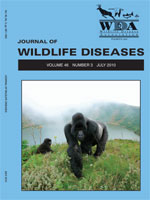Invasive, hypermucoid Klebsiella pneumoniae causes severe abscess formation in humans and in certain species of nonhuman primates. We conducted a survey of captive and wild-caught African green monkeys, or vervets (Chlorocebus aethiops sabaeus), on the Caribbean island of St. Kitts to assess their carriage rate of Klebsiella spp. Forty percent of rectal swabs from captive monkeys were positive for K. pneumoniae, and 20% of wild-caught animals were positive. Two wild-caught monkeys (4%) were positive for K. oxytoca, and one monkey (2%) was found to be infected with a hypermucoid rmpA-positive K. pneumoniae strain. Genotyping of this strain showed that it had an indistinguishable random amplified polymorphic DNA fingerprint to a strain that caused fatal abscessation in several African green monkeys in a research colony in the USA in 2005. This is the first report of hypermucoid K. pneumoniae isolation from a wild population of nonhuman primates and represents a potential health risk to these animals, as well as to the humans who come in contact with them.
How to translate text using browser tools
1 July 2010
Prevalence of Hypermucoid Klebsiella pneumoniae among Wild-caught and Captive Vervet Monkeys (Chlorocebus aethiops sabaeus) on the Island of St. Kitts
Chris A. Whitehouse,
Natalie Keirstead,
Justin Taylor,
Jessica L. Reinhardt,
Amy Beierschmitt
ACCESS THE FULL ARTICLE

Journal of Wildlife Diseases
Vol. 46 • No. 3
July 2010
Vol. 46 • No. 3
July 2010
abscess
African green monkeys
conservation medicine
ecohealth
enteric bacteria
nonhuman primate
zoonosis




